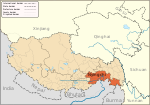Bayi Subdistrict
The new subdistrict completely absorbed the ancient village of Drakchi, which used to stand on this site. The population is now mostly Han Chinese. The Bayi Zanchen bridge crosses the Nyang-chu or Nyang River here.
There are 9 villages under the jurisdiction of the subdistrict, with a total population of 21,400, from the Han, Hui, Mongolian, Xibe, Manchu ethnicities. The subdistrict covers an area of 55 square kilometres (21 sq mi), with an area of 51,047 mu (3,403 ha) of cultivated land. There has been the extension of two major irrigation channels in the subdistrict to provide for rice farming and the production of other cash crops.
Climate
Bayi has a subtropical highland climate with monsoonal influences (Köppen Cwb). Precipitation is abundant compared to other areas in Tibet and the area around Bayi is covered with trees.
| Climate data for Bayi (1971−2000) | |||||||||||||
|---|---|---|---|---|---|---|---|---|---|---|---|---|---|
| Month | Jan | Feb | Mar | Apr | May | Jun | Jul | Aug | Sep | Oct | Nov | Dec | Year |
| Record high °C (°F) | 16.3 (61.3) |
20.2 (68.4) |
20.8 (69.4) |
25.3 (77.5) |
27.0 (80.6) |
28.3 (82.9) |
30.3 (86.5) |
29.5 (85.1) |
27.6 (81.7) |
24.0 (75.2) |
19.9 (67.8) |
16.0 (60.8) |
30.3 (86.5) |
| Mean daily maximum °C (°F) | 8.3 (46.9) |
9.5 (49.1) |
13.0 (55.4) |
16.4 (61.5) |
19.2 (66.6) |
21.4 (70.5) |
22.1 (71.8) |
22.0 (71.6) |
20.3 (68.5) |
17.3 (63.1) |
13.4 (56.1) |
9.8 (49.6) |
16.1 (61.0) |
| Daily mean °C (°F) | 0.5 (32.9) |
2.3 (36.1) |
5.5 (41.9) |
8.5 (47.3) |
11.8 (53.2) |
14.8 (58.6) |
15.8 (60.4) |
15.3 (59.5) |
13.5 (56.3) |
10.0 (50.0) |
5.2 (41.4) |
1.4 (34.5) |
8.7 (47.7) |
| Mean daily minimum °C (°F) | −5 (23) |
−2.7 (27.1) |
0.6 (33.1) |
3.4 (38.1) |
6.7 (44.1) |
10.3 (50.5) |
11.5 (52.7) |
11.0 (51.8) |
9.5 (49.1) |
5.3 (41.5) |
−0.6 (30.9) |
−4.4 (24.1) |
3.8 (38.8) |
| Record low °C (°F) | −13.7 (7.3) |
−11.3 (11.7) |
−8.7 (16.3) |
−4.2 (24.4) |
−1.6 (29.1) |
3.5 (38.3) |
4.4 (39.9) |
5.0 (41.0) |
1.0 (33.8) |
−4.8 (23.4) |
−8.3 (17.1) |
−11.6 (11.1) |
−13.7 (7.3) |
| Average precipitation mm (inches) | 1.6 (0.06) |
4.4 (0.17) |
17.0 (0.67) |
47.1 (1.85) |
74.3 (2.93) |
125.2 (4.93) |
133.9 (5.27) |
123.3 (4.85) |
114.6 (4.51) |
39.9 (1.57) |
5.3 (0.21) |
1.4 (0.06) |
688 (27.08) |
| Average precipitation days (≥ 0.1 mm) | 2.8 | 6.0 | 11.5 | 17.3 | 19.6 | 23.0 | 22.8 | 21.5 | 22.2 | 14.0 | 4.0 | 1.7 | 166.4 |
| Source: Weather China | |||||||||||||
Footnotes
- ^ Buckley and Strauss (1986), p. 210.
- ^ Dorje (1999), p. 236.
- ^ "China plans 'Swiss makeover' for tourism in southeast Tibet | CNNGo.com". Archived from the original on 2012-06-30. Retrieved 2012-07-01.
References
- Buckley, Michael and Robert Strauss. (1986). Tibet: A Survival Kit. Lonely Planet, St. Kilda, Victoria, Australia. ISBN 0-908086-88-1.
- Dorje, Gyume. (1999). Footprint Tibet Handbook with Bhutan. 2nd Edition. Footprint Handbooks, Bath, England. ISBN 1-900949-33-4.
- Dreams Travel China Guide
- www.xza.cn (in Chinese)
